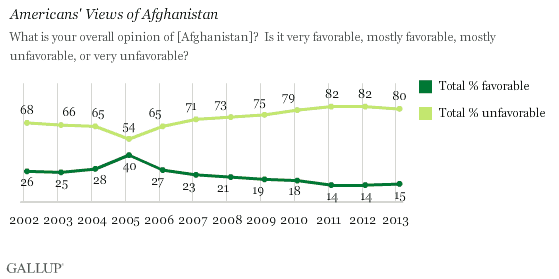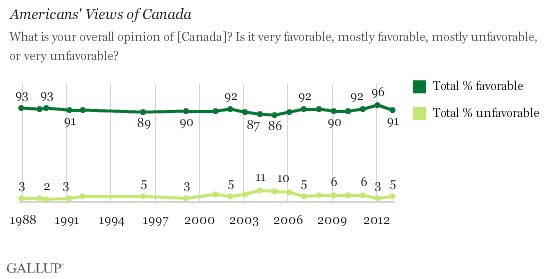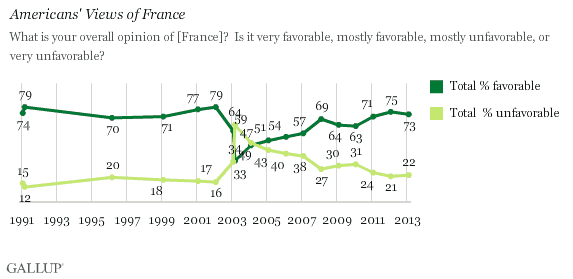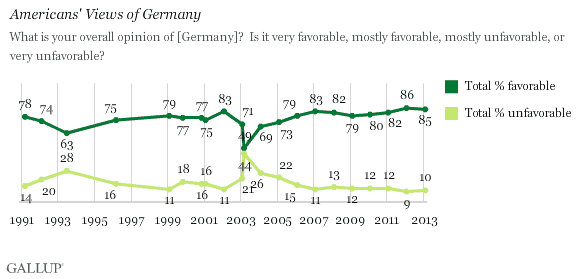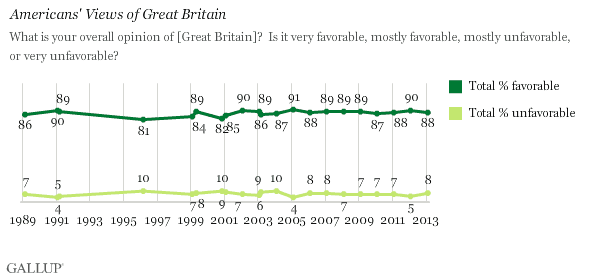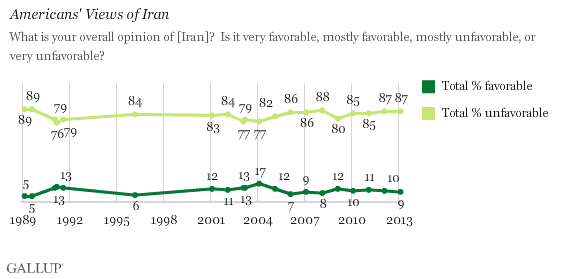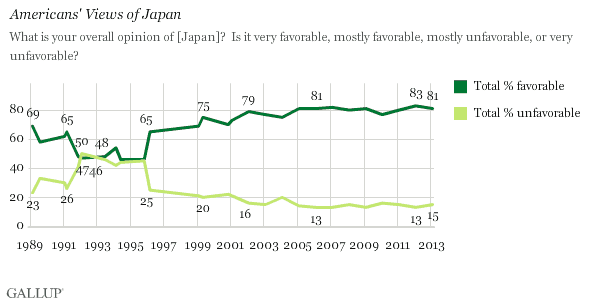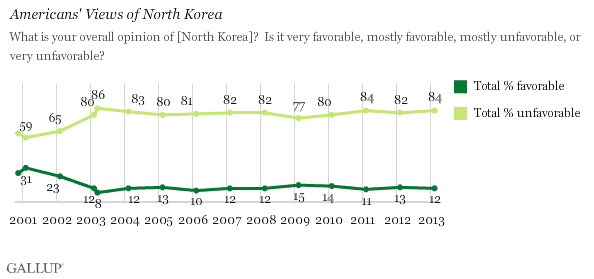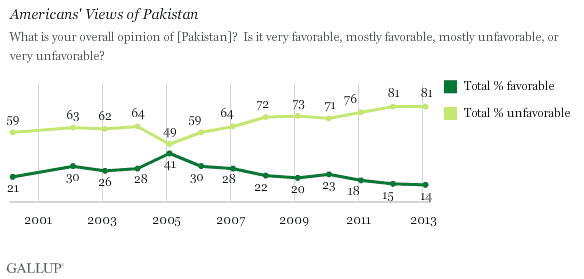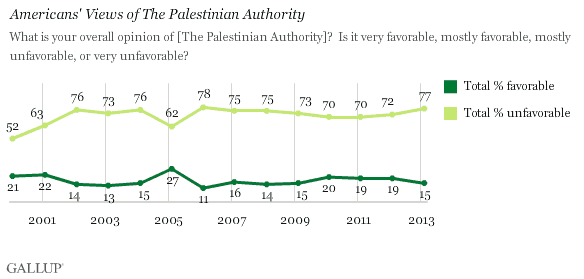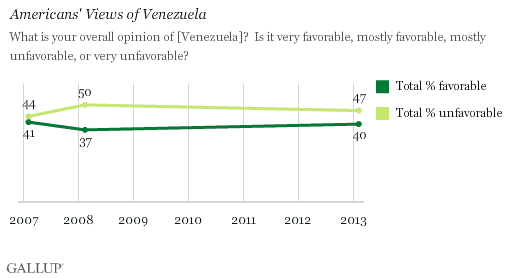PRINCETON, NJ -- The slight majority of Americans, 53%, now hold an unfavorable view of Egypt and 40% a favorable view. That is the most negative tilt in Americans' views of Egypt since Gallup began measuring favorability toward the country in this format in 1991.
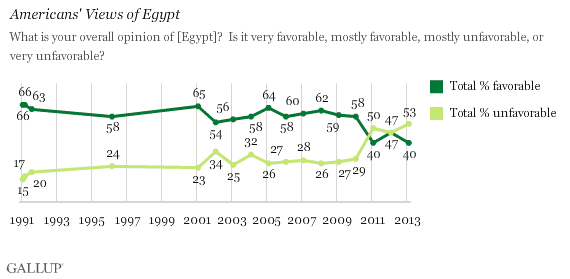
Americans' opinions of Egypt were more unfavorable than favorable for the first time in 2011 when the country became embroiled in anti-government protests that ultimately led to the ousting of longtime President Hosni Mubarak from power. Egypt's image in the U.S. recovered slightly in 2012, but this year, its favorable ratings fell to their lowest yet.
These results are from Gallup's annual World Affairs survey, conducted Feb. 7-10 this year. As Gallup previously reported, U.S. favorability toward the 22 rated countries ranges from a high of 91% for Canada to a low of 9% for Iran.
While Americans' favorable ratings of most countries stayed the same or fell slightly this year, ratings of India, Russia, Saudi Arabia, Iraq, Libya, and Israel -- in addition to Egypt -- saw notable declines.
Views of India Worsen, but Still on Higher End Historically
Americans' positive perceptions of India fell seven percentage points over the past year, to 68%. However, this follows unusually high favorability toward that country in 2012, at 75%. The current rating is similar to what Gallup found between 2006 and 2010. The broader trend is one of improving favorability toward India since 2000, when Americans were closely divided in how they viewed it.
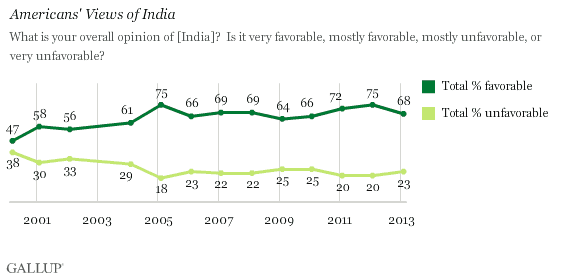
Views Toward Russia Turn Negative Again
More Americans view Russia unfavorably than favorably in 2013 -- 50% vs. 44% -- contrasting with positive leanings in each of the previous three years.
Americans' views of Russia have been intriguingly volatile since 1989, when the country was first rated as "Russia," just a few years before the Soviet Union officially dissolved. In general, Americans' views have been more favorable than unfavorable over these 24 years, but with periods -- including this year -- when the unfavorable attitudes have prevailed. Other periods when attitudes toward Russia tilted negative were at the end of the 1990s and in the early 2000s, again in 2003, and in 2009.
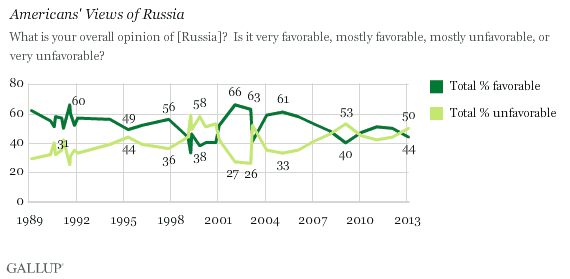
Saudi Arabia Locked in Negative Territory Since 9/11
The 36% of Americans who view Saudi Arabia favorably and 58% who view it unfavorably is similar to the average review of that country since 2005, but is slightly more negative than in 2012, when Americans gave the country its most positive ratings since 9/11.
When Gallup first asked Americans to rate Saudi Arabia in August 1991, not long after that country provided the staging ground for America's successful actions against Iraq in the Persian Gulf War, the public's views were quite positive. By February 2002, however, five months after the 9/11 terrorist attacks, Americans' attitudes had shifted to the strongly unfavorable side of the ledger, and have remained negative -- with some fluctuation -- ever since.
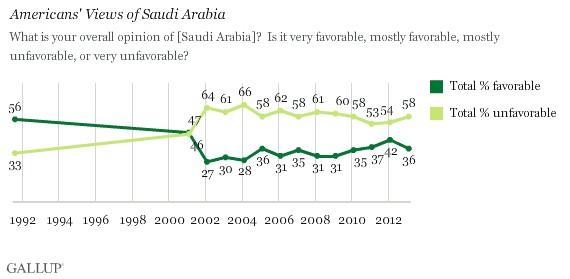
Favorability Toward Iraq Lowest Since 2009
Americans' favorable views of Iraq fell five percentage points to 19% in 2013, the lowest in Gallup trends since 2007.
Prior to 2004, Americans' ratings of Iraq were among the most negative of all countries Gallup measured. Americans' favorable attitudes about Iraq climbed from 5% in 2003 to 21% in 2004, after the U.S. had invaded the country in an effort to depose leader Saddam Hussein -- and then went up again to 29% in 2005. Since then, favorable attitudes of Iraq have ranged from as low as 15% in 2007 to as high as 28% in 2009.
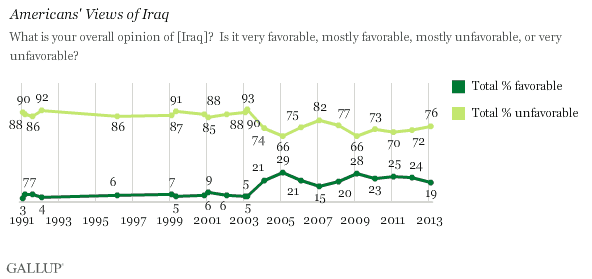
Slight Retreat in Already-Minimal Favorability Toward Libya
Five months after the U.S. ambassador to Libya and other Americans were killed in an armed attack on the U.S. consulate in Benghazi, Libya, 20% of Americans have a favorable opinion of that country, down slightly from 25% in 2012. American attitudes toward Libya have grown more negative over each of the past two years despite Libyan leader Moammar Gadhafi's having been deposed in October 2011, after the country was taken over by disaffected rebel factions. Previously, Gallup had seen a slight improvement in Americans' views of Libya, after Gadhafi's December 2003 unilateral disarmament agreement with the U.S.
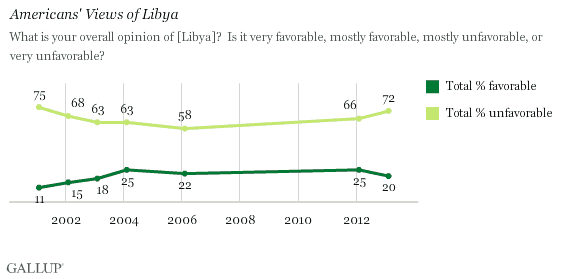
Ever-Fluctuating Favorability Toward Israel Dips to 66%
After surpassing 70% in 2012 for only the third time in Gallup trends, favorability toward Israel fell back to 66% this year, similar to the level in 2010 and 2011. Americans' views toward Israel have been largely positive since 1996; however, the precise percentage viewing the country favorably has shown a good deal of fluctuation -- between 54% and 71%.
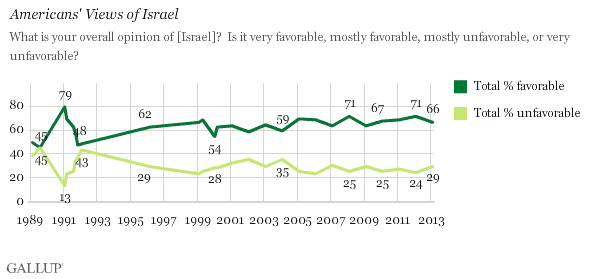
Views of Other Countries Stable in 2013, but Have Varied Long-Term
Americans' views toward four other countries included in the survey this year have shown long-term variation, although little change just in the past year. These include China and Mexico -- whose images have at times tilted negative and at other times positive -- as well as Syria and Cuba, whose images have been consistently negative but to varying degrees.
Trend on China Mostly Negative
Americans this year are more negative (52%) than positive (43%) about China, consistent with the pattern in recent years. But Americans' favorable views of China were very high at two historical points: in 1979 and again in 1989, immediately after former President George H.W. Bush visited China, and just prior to the Tiananmen Square massacre the same year, which caused Americans' ratings to plunge back into negative territory.
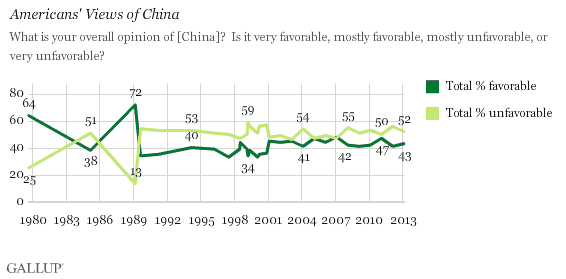
Favorability Toward Mexico Has Dwindled Since 2005 After Previously Rising
Americans' views of Mexico are roughly even, with 49% giving the country an unfavorable rating and 47% a favorable rating. These generally mixed views of America's neighbor to the south have prevailed since 2010. Prior to that point, Americans' views were much more positive, including a high of 74% favorable in 2003 and 2005.
The drop in positive attitudes about Mexico is likely a result of the negative publicity about the drug and gang wars ravaging parts of that country, particularly along the U.S. border, as well as issues related to illegal immigration from Mexico into the U.S.
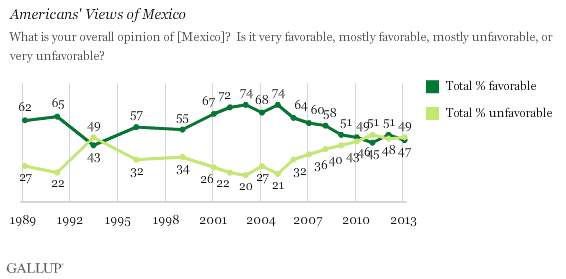
Negative Views of Syria Have Surged Since 2000
Americans' views of Syria, with 75% holding an unfavorable view of it, are the most negative since the country was first measured in 1991. The current civil war going on in Syria may be responsible for the more negative views, although 66% of Americans had a negative view in 2007, well before the current fighting.
At one point in early 2000, unfavorable views were at 44%, although that low reading was largely a function of the fact that more than 35% of Americans didn't have an opinion about Syria.
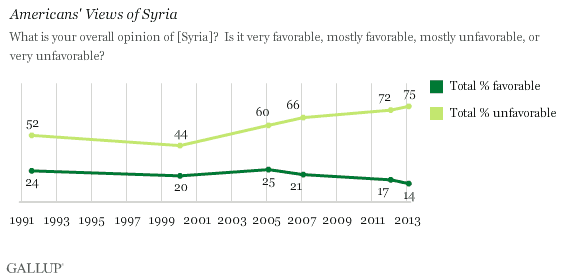
Negativity Toward Cuba Less Extensive than in Mid 1990s
Americans' ratings of Cuba -- 34% favorable and 59% unfavorable -- are, along with last year's ratings, the most positive in the 17 years Gallup has asked Americans to rate the communist-led island nation.
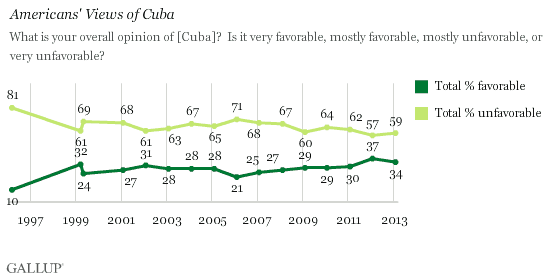
Countries With Consistently Positive or Negative Ratings
Americans' views of Iran, North Korea, Pakistan, Afghanistan, and the Palestinian Authority are also broadly negative, similar to the balance of views toward Iraq and Libya. All five have unfavorable ratings of 77% or higher, and these have been consistently high in recent years. Views toward Venezuela have also been consistently negative, although not quite as lopsidedly. Full trends on the ratings of these countries are on Page 2.
The images of six countries -- Canada, Great Britain, Germany, Japan, and France -- have been solidly positive in recent years, although Americans have rated several of these more negatively at previous times. Full trends on the ratings of these countries are also shown on Page 2.
Americans' ratings of France and Germany turned negative in 2003 when these countries declined to assist the United States with its invasion of Iraq. Ratings of both countries have, however, have returned to where they were prior to 2003.
Bottom Line
Americans' ratings of Egypt are the most negative Gallup has recorded in two decades of measuring that country's image in the U.S., although they are only slightly worse than ratings from two years ago. Their ratings of Syria are at an all-time low, after several years of decline. At the same time, favorability toward several other Mideast countries -- including Saudi Arabia, Iraq, Libya, and Israel -- as well as India and Russia dipped in the past year. Whether these changes reflect Americans' reaction to specific policies or political conflict occurring in those countries, or is part of a more general decrease in U.S. attitudes toward foreign countries this year, is not clear.
Survey Methods
Results for this Gallup poll are based on telephone interviews conducted Feb. 7-10, 2013, with a random sample of 1,015 adults, aged 18 and older, living in all 50 U.S. states and the District of Columbia.
For results based on the total sample of national adults, one can say with 95% confidence that the margin of sampling error is ±4 percentage points.
Interviews are conducted with respondents on landline telephones and cellular phones, with interviews conducted in Spanish for respondents who are primarily Spanish-speaking. Each sample of national adults includes a minimum quota of 50% cellphone respondents and 50% landline respondents, with additional minimum quotas by region. Landline telephone numbers are chosen at random among listed telephone numbers. Cellphones numbers are selected using random digit dial methods. Landline respondents are chosen at random within each household on the basis of which member had the most recent birthday.
Samples are weighted to correct for unequal selection probability, nonresponse, and double coverage of landline and cell users in the two sampling frames. They are also weighted to match the national demographics of gender, age, race, Hispanic ethnicity, education, region, population density, and phone status (cellphone only/landline only/both, cellphone mostly, and having an unlisted landline number). Demographic weighting targets are based on the March 2012 Current Population Survey figures for the aged 18 and older U.S. population. Phone status targets are based on the July-December 2011 National Health Interview Survey. Population density targets are based on the 2010 census. All reported margins of sampling error include the computed design effects for weighting.
In addition to sampling error, question wording and practical difficulties in conducting surveys can introduce error or bias into the findings of public opinion polls.
For more details on Gallup's polling methodology, visit www.gallup.com.
